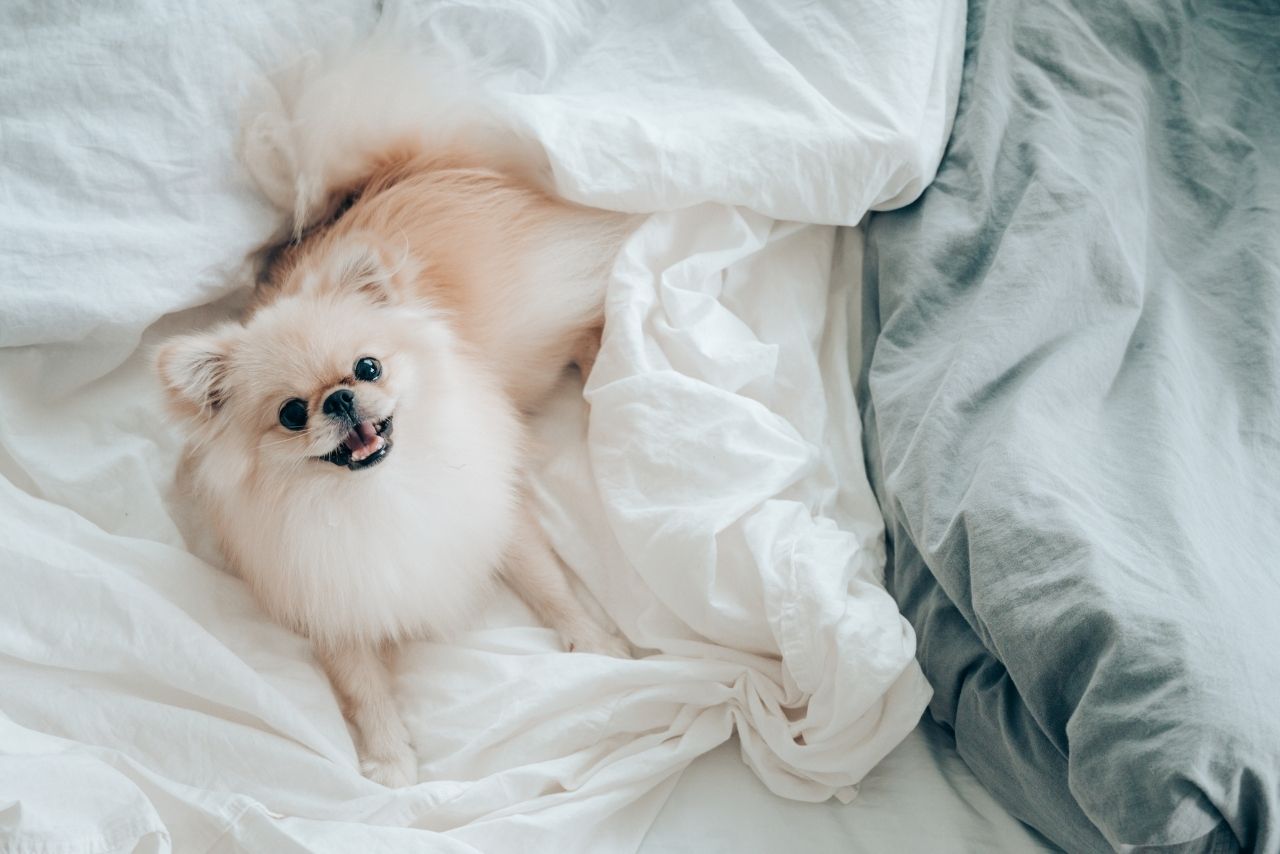Why Do Dogs Lick Blankets? (The Surprising Reasons!)

Have you ever wondered why dogs have a strange habit of licking blankets? It’s a common behavior that many dog owners find both puzzling and adorable.
Well, the answer to the question “Why Do Dogs Lick Blankets? ” can be attributed to several factors.
Licking is a natural behavior in dogs. Dogs may lick blankets to self-soothe, investigate scents, show affection, or seek attention from their owners.
Firstly, licking is a natural behavior for dogs. It’s their way of exploring and interacting with their environment.
In the case of blankets, dogs may be drawn to the texture or scent of the fabric. Licking also releases endorphins in their brain, which helps them feel relaxed and content.
Another reason why dogs lick blankets is because it provides comfort and security.
Just like humans who cuddle with pillows or soft toys, some dogs find solace in licking objects that possess familiar scents or are associated with their owners’ presence.
This behavior can stem from separation anxiety or simply as a self-soothing mechanism when they’re feeling stressed or anxious.
So next time you catch your furry friend indulging in this peculiar habit, remember that it’s just another way for them to navigate their world and find comfort in your absence.
Reasons Dogs Lick Blankets:
Dogs have a variety of behaviors that can sometimes leave us puzzled. One such behavior is their tendency to lick blankets.
While it may seem strange to us, there are actually several reasons why dogs engage in this behavior:
- Comfort and Security: Dogs often view their owners’ scent as comforting and soothing. By licking blankets, which carry the familiar scent of their human companions, dogs create a sense of security for themselves.
- Territorial Marking: Licking blankets can be seen as a way for dogs to mark their territory. The act of licking leaves behind their saliva, which contains pheromones unique to each dog. This territorial marking instinct helps them establish ownership over the blanket.
- Anxiety Relief: Just like humans use stress-relief techniques, dogs also find comfort in repetitive actions like licking blankets when they feel anxious or stressed out.
- Attention-seeking Behavior: Some dogs may lick blankets simply because they want attention from their owners or other family members. They might have learned that engaging in this behavior gets them the desired response.
- Boredom or Lack of Stimulation: Dogs are intelligent animals that require mental stimulation and physical exercise to stay happy and contented. When bored or lacking sufficient activity, some dogs resort to licking objects like blankets as a way to entertain themselves.
- Oral Fixation: Certain breeds or individual dogs might develop an oral fixation, causing them to constantly seek objects for chewing or licking purposes.
- Medical Conditions: In some cases, excessive blanket-licking may be indicative of underlying medical issues such as allergies, gastrointestinal problems, dental pain, or compulsive disorders related to obsessive-compulsive disorder (OCD).
Understanding why your dog licks blankets can help you address any potential concerns associated with this behavior effectively while ensuring your furry friend’s well-being.
The Science Behind Dog’s Licking Behavior:
Dogs are known for their curious licking behavior, and while it may seem strange to us humans, there is actually some science behind why dogs lick blankets.
Here’s a closer look at the reasons behind this behavior:
- Sensory Exploration: Dogs use their tongues as a way to explore and gather information about their environment, including blankets. Their sense of taste is quite powerful, allowing them to detect different scents and flavors that may be present on the fabric.
- Comfort and Soothing: Licking can have a calming effect on dogs, releasing endorphins that help reduce stress or anxiety. Blankets often provide a soft texture that can bring comfort to dogs who engage in this behavior.
- Natural Instincts: Licking is an instinctive behavior for dogs inherited from their wild ancestors. In the wild, adult wolves regurgitate food for their young pups by licking them. This act of licking serves as a means of communication and bonding within the pack.
- Territory Marking: Dogs have scent glands in their mouths which release pheromones when they lick objects like blankets. By doing so, they are marking the item with their unique scent as a way to claim ownership or establish familiarity within their territory.
- Attention Seeking: Some dogs may resort to licking behaviors as a means of getting attention from their owners or satisfying boredom when left alone for extended periods of time.
While occasional blanket licking is generally harmless, excessive or compulsive licking could indicate underlying issues such as anxiety or medical conditions like allergies or gastrointestinal problems.
If you notice any concerning patterns in your dog’s behavior, it’s always best to consult with your veterinarian.
Understanding the science behind why dogs lick blankets can help shed light on this peculiar canine habit.
Whether it’s sensory exploration, seeking comfort, marking territory or simply seeking attention.
Dogs have their reasons for this behavior.
So, the next time you catch your furry friend engaging in a licking session with their favorite blanket, you’ll know there’s more to it than meets the eye.
Instinctual Behaviors in Canines:
Dogs exhibit a range of instinctual behaviors that have been shaped by their evolutionary history.
These behaviors serve various purposes, including communication, self-soothing, and survival.
Understanding these instincts can help dog owners better comprehend their pet’s actions and provide appropriate care.
Here are some common instinctual behaviors seen in dogs:
- Licking: Dogs use licking as a way to communicate with both humans and other animals. It is often a sign of affection or submission. Additionally, licking can be soothing for dogs, similar to how humans may bite their nails when stressed.
- Chewing: Chewing is an innate behavior in dogs that serves multiple purposes. Puppies chew on objects to assist with teething and explore their environment through taste and texture. Adult dogs may continue chewing as a way to alleviate boredom or relieve anxiety.
- Digging: Digging is deeply rooted in a dog’s ancestry as it was once necessary for survival-related activities like hunting prey or creating shelter. Today, digging remains an instinctual behavior that can indicate boredom or the desire to bury valued possessions.
- Marking Territory: Dogs naturally mark their territory by urinating on specific spots during walks or within the house if not properly trained otherwise. This behavior helps establish boundaries and communicate with other animals but might require correction if it becomes excessive indoors.
- Scenting: A dog’s sense of smell far surpasses that of humans; therefore, they engage in scent-marking activities such as rubbing against furniture or rolling on grassy areas where scents linger from other animals’ presence.
Understanding these instinctive behaviors allows us to appreciate our furry companions’ natural inclinations while guiding them towards appropriate outlets for expression without compromising household harmony.
Possible Health Concerns for Dogs Who Lick Blankets:
When dogs constantly lick blankets, it may be a cause for concern as it can indicate underlying health issues.
Here are some potential health concerns to watch out for:
- Gastrointestinal Distress: Excessive blanket licking could be a sign of an upset stomach or gastrointestinal discomfort in dogs. It might be accompanied by symptoms like vomiting, diarrhea, or abdominal pain.
- Allergies: Dogs can develop allergies to certain materials used in blankets, such as wool or synthetic fibers. If your dog licks blankets excessively and exhibits other allergy symptoms like itching, redness, or hair loss, they may have an allergic reaction.
- Skin Irritation: Constant licking of blankets can cause skin irritation and inflammation on the dog’s paws and around their mouth area. This could lead to hot spots or dermatitis if not addressed promptly.
- Dental Problems: Dogs with dental issues might resort to excessive licking as a way to alleviate discomfort in their mouth. Tartar buildup, gum disease, fractured teeth, or oral infections can all contribute to this behavior.
- Anxiety and Stress: Just like humans, dogs can experience anxiety and stress that manifests through various behaviors including blanket licking. Separation anxiety or feeling overwhelmed by changes in their environment could trigger this behavior.
- Obsessive-Compulsive Disorder (OCD): In some cases, repetitive blanket licking may indicate OCD-like behavior in dogs where they engage in compulsive actions without any apparent reason.
If you notice your dog frequently licking blankets along with any concerning symptoms mentioned above, it is advisable to consult a veterinarian for proper diagnosis and guidance on how best to address the issue.
How to Redirect Your Dog’s Licking Habit?
If your dog has developed a habit of licking blankets, it’s important to redirect their behavior in a positive and appropriate way.
Here are some strategies you can use:
- Provide suitable alternatives: Dogs often lick as a soothing mechanism or out of boredom. Offer your furry friend alternative activities that provide mental and physical stimulation, such as puzzle toys or chew treats.
- Establish a consistent routine: Dogs thrive on routine, so creating a structured schedule can help eliminate excessive licking. Regular exercise and playtime will keep them engaged and less likely to resort to blanket licking.
- Use deterrents: Make the blankets less appealing by applying taste deterrents specifically designed for pets. These products have safe ingredients that dogs find unappealing but won’t harm them.
- Teach the “Leave It” command: Train your dog to understand the “Leave It” command, which will allow you to redirect their attention away from the blankets whenever they start licking them excessively.
- Provide mental enrichment: Engage your dog with interactive toys or games that stimulate their senses and keep them mentally occupied. This will not only distract them from blanket licking but also provide entertainment.
- Seek professional advice if necessary: If your dog’s blanket licking habit persists despite trying various redirection techniques, consult with a veterinarian or an animal behaviorist for further guidance tailored to your specific situation.
Remember, consistency is key when attempting to redirect any unwanted behavior in dogs. Be patient with the process and reward positive behaviors along the way.
Training Methods to Stop Dogs from Licking Blankets:
If your dog has developed a habit of licking blankets, it’s important to address this behavior in a positive and effective manner.
Here are some training methods that can help you discourage your furry friend from engaging in this behavior:
- Redirect the Behavior: Whenever you catch your dog licking a blanket, redirect their attention to an appropriate chew toy or bone. Encourage them to engage with the toy instead, rewarding them when they do so.
- Positive Reinforcement: Use positive reinforcement techniques such as praise, treats, or playtime whenever your dog refrains from licking blankets. This will reinforce good behavior and make them more likely to repeat it.
- Create Distractions: Provide plenty of mental and physical stimulation for your pup through interactive toys, puzzle games, or regular exercise sessions. A tired and mentally stimulated dog is less likely to resort to blanket licking out of boredom.
- Use Taste Deterrents: Apply taste deterrent sprays specifically designed for dogs onto the blankets they frequently lick. These sprays have bitter flavors that dogs generally dislike, discouraging them from continuing the behavior.
- Establish Boundaries: Set clear boundaries by using commands like “Leave it” or “No.” Consistently enforce these commands whenever you notice your dog attempting to lick blankets and reward them when they comply.
- Provide Alternative Comfort Items: If you suspect that anxiety or stress may be triggering the blanket licking behavior, provide alternative comfort items such as soft plush toys or a cozy bed for them to snuggle up with instead.
- Consult Professional Help: If despite trying these methods the problem persists or worsens over time, consider seeking guidance from a professional trainer or animal behaviorist who can provide personalized advice based on your specific situation.
Remember that patience and consistency are key when training any unwanted behaviors out of our furry companions.
With time and effort, you can help your dog overcome the habit of licking blankets and redirect their focus onto more appropriate activities.
Tips for Maintaining Clean and Odor-Free Blankets:
To keep your blankets clean and odor-free despite your dog’s licking habits, follow these simple tips:
- Regular Washing: It is essential to wash your blankets regularly to remove dirt, hair, and any lingering odors. Follow the care instructions provided by the manufacturer for best results.
- Pre-treat Stains: If you notice any stains on your blankets caused by saliva or other substances, pre-treating them before washing can help ensure they are fully removed. Use a stain remover suitable for fabric types.
- Choose Appropriate Detergent: Selecting a detergent that is gentle yet effective in removing dirt and odors is crucial when washing dog-licked blankets. Opt for mild detergents specifically designed for sensitive skin or pet-friendly alternatives.
- Hot Water Wash: Using hot water during the wash cycle helps eliminate bacteria, allergens, and unpleasant smells effectively from your blankets. Always check the care label of your blanket to ensure it can withstand hot water temperatures.
- Avoid Fabric Softeners: While fabric softeners may make clothes feel softer, they can leave residues on fabrics that might attract more dirt or irritate a sensitive dog’s skin. Skip using fabric softeners when laundering dog-licked blankets.
- Dry Thoroughly: Ensure that you dry your washed blanket thoroughly after each wash cycle to prevent mold or mildew growth due to moisture retention within the fibers of the fabric.
- Air Out in Sunlight: When weather permits, hang your freshly laundered blanket outside in direct sunlight as it helps naturally kill germs while offering additional freshness and reducing residual odors.
- Protective Covers: Consider using protective covers over frequently-used blankets so that you can easily remove them without having to worry about cleaning every time your furry friend decides to lick excessively.
By following these tips, you can maintain clean and odor-free blankets even if your dog has a penchant for licking. Remember to always provide your dog with appropriate chew toys and attention to help redirect their behavior away from blankets.
Conclusion: Why Do Dogs Lick Blankets?
In conclusion, dogs licking blankets is a common behavior that can be attributed to a combination of natural instincts and learned behaviors.
While it may seem strange to us humans, there are several reasons why dogs engage in this behavior.
One possible reason is that licking blankets provides comfort for dogs. Licking releases endorphins in their brains, which helps them relax and reduces stress.
Additionally, the soft texture of the blanket may remind them of their mother’s fur when they were puppies, providing a sense of security.
Another reason why dogs lick blankets is to mark their territory.
Dogs have scent glands in their mouths that release pheromones when they lick objects.
By licking blankets, they are leaving behind their scent as a way to claim ownership.
So, if you find your furry friend indulging in some blanket-licking action, don’t worry! It’s just one of the many fascinating behaviors that make our canine companions so unique and lovable.






